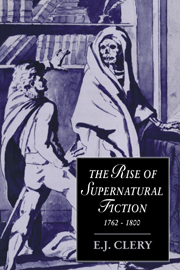Book contents
- Frontmatter
- Contents
- List of illustrations
- Acknowledgements
- Introduction
- PART I TECHNIQUES OF GHOST-SEEING
- PART II THE BUSINESS OF ROMANCE
- PART III THE STRANGE LUXURY OF ARTIFICIAL TERROR
- 6 Women, luxury and the sublime
- 7 The supernatural explained
- 8 Like a heroine
- PART IV MAGICO-POLITICAL TALES
- Afterword
- Notes
- Bibliography
- Index
- CAMBRIDGE STUDIES IN ROMANTICISM
8 - Like a heroine
Published online by Cambridge University Press: 03 December 2009
- Frontmatter
- Contents
- List of illustrations
- Acknowledgements
- Introduction
- PART I TECHNIQUES OF GHOST-SEEING
- PART II THE BUSINESS OF ROMANCE
- PART III THE STRANGE LUXURY OF ARTIFICIAL TERROR
- 6 Women, luxury and the sublime
- 7 The supernatural explained
- 8 Like a heroine
- PART IV MAGICO-POLITICAL TALES
- Afterword
- Notes
- Bibliography
- Index
- CAMBRIDGE STUDIES IN ROMANTICISM
Summary
‘You must confess that novels are more true than histories, because historians often contradict each other, but novelists never do’: the would-be heroine of E. S. Barrett's satire of romance fiction, The Heroine, goes on the the attack against the conventional depreciation of the ‘feminine’ novel in favour of ‘masculine’ history. Gender is at the root of the matter when it is raised again in Northanger Abbey, for history, Catherine Morland observes, ‘tells me nothing that does not either vex or weary me. The quarrels of popes and kings, with wars and pestilences in every page; the men all so good for nothing, and hardly any women at all, it is very dull.’ Both of these satires set out to show, in comic terms, what happens when an avid consumer of sensational novels fulfils at least part of James Beattie's gloomy prognosis:
Romances are a dangerous recreation … and tend to corrupt the heart, and stimulate the passions. A habit of reading them breeds a dislike to history, and all the substantial parts of knowledge; withdraws the attention from nature and truth; and fills the mind with extravagant thoughts, and too often with criminal propensities.
– and comes to read her own ‘history’ as if it were a sensational narrative.
Yet on the way to the satire's final rationalist confirmation of the divide between fact and fiction a curious alchemy takes place. Common sense, in temporarily assuming a fantastic disguise, finds it cannot so easily shake it off again.
- Type
- Chapter
- Information
- The Rise of Supernatural Fiction, 1762–1800 , pp. 115 - 130Publisher: Cambridge University PressPrint publication year: 1995
- 1
- Cited by

